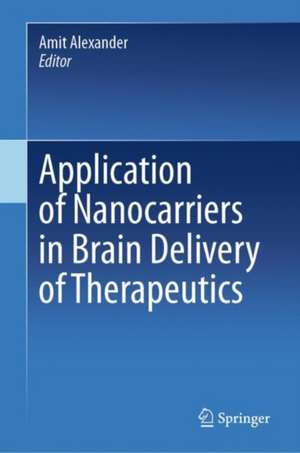Application of Nanocarriers in Brain Delivery of Therapeutics
Editat de Amit Alexanderen Limba Engleză Hardback – 31 aug 2024
Preț: 1169.77 lei
Preț vechi: 1231.35 lei
-5% Nou
Puncte Express: 1755
Preț estimativ în valută:
223.85€ • 231.28$ • 186.21£
223.85€ • 231.28$ • 186.21£
Carte disponibilă
Livrare economică 26 februarie-12 martie
Preluare comenzi: 021 569.72.76
Specificații
ISBN-13: 9789819728589
ISBN-10: 9819728584
Pagini: 300
Ilustrații: Approx. 300 p. 40 illus.
Dimensiuni: 155 x 235 mm
Greutate: 0.73 kg
Ediția:2024
Editura: Springer Nature Singapore
Colecția Springer
Locul publicării:Singapore, Singapore
ISBN-10: 9819728584
Pagini: 300
Ilustrații: Approx. 300 p. 40 illus.
Dimensiuni: 155 x 235 mm
Greutate: 0.73 kg
Ediția:2024
Editura: Springer Nature Singapore
Colecția Springer
Locul publicării:Singapore, Singapore
Cuprins
Chapter 1. Introduction to complex brain disorders, currently available therapies, and their limitations.- Chapter 2. Challenges of brain targeting and mechanism of drug transfer across BBB.- Chapter 3. Introduction to nanoparticles as a potential carrier for brain targeting.- Chapter 4. Application of polymeric nanoparticles in brain targeting.- Chapter 5. Recent advancements in lipid nanocarriers for brain delivery of bioactive.- Chapter 6. Liposomes as a potential carrier for brain delivery.- Chapter 7. Inorganic nanoparticles for brain targeting: scope and limitations.- Chapter 8. Potential of dendrimers as a nanocarrier for brain delivery.- Chapter 9. Surface active ligands for enhanced brain targeting of nanoparticles.- Chapter 10. Stimuli-responsive polymers for brain delivery.- Chapter 11. In vitro cell line development and their limitations for brain research.- Chapter 12. In vivo Animal model development and their limitation for brain research.- Chapter 13. Safety, stability concerns, and regulatory aspects of Nanocarriers for brain delivery.- Chapter 14. Current clinical advancements of nanocarriers for brain targeting and limitations in clinical translation.
Notă biografică
Dr. Amit Alexander is an Associate Professor in the Department of Pharmaceutics, National Institute of Pharmaceutical Education and Research (NIPER), Guwahati, Assam, under the aegis of the Department of Pharmaceuticals (DoP), Ministry of Chemicals and Fertilizers, Government of India (GoI). He has overall academic experience of more than 13 years in Novel drug delivery systems, Pharmacokinetics, Biopharmaceutics, Statistical Design, Drug Targeting approaches, etc. He is an active member of the Royal Society of Chemistry (MRSC), London, United Kingdom (UK), Royal Society of Biology (MRSB), London, United Kingdom (UK), Controlled Release Society-Indian Local Chapter (CRS-IC), Mumbai, Indian Academy of Neuroscience (IAN) and a life fellow of Indian Chemical Society (FICS), Kolkata. His research interest is in pharmaceutical dosage form development, novel drug delivery systems focusing on nanoparticles and stimuli-responsive hydrogels for critical pathophysiological conditions mainly for brain disorders and tumor targeting. Dr. Alexander specifically works on controlled release and targeting of the drug by utilizing novel approaches. He has been conferred with various prestigious awards notably, UGC-JRF 2011, Dr. P. D. Sethi Annual Award-2012, Young Scientist at Chhattisgarh Young Scientists Congress-2013, Young Researcher Award-2020, First Prize in several National and International conferences, and many Foreign Travel Grants from Government agencies like SERB, DST, CSIR, ICMR for presenting his research work. He has been listed in the Top 2% scientists from India in World Ranking for 2 consecutive years (2020 & 2021) by Stanford University, USA. He has served as a referee for a number of SCI-indexed International journals and is also serving as a review editor in Frontier in Biomaterial Journal. He has presented many invited talks and oral presentations at various International and National scientific peer conferences and attended seminars and conferences as keynote speaker/chairperson and evaluator.
Textul de pe ultima copertă
This book presents nanoparticles as potential drug delivery carriers for overcoming the blood-brain barrier. The initial chapter of the book discusses complex brain disorders, the currently available therapies, and their limitations. The book discusses the potential applications of polymeric nanoparticles, lipid nanocarriers, liposomes, inorganic nanoparticles, dendrimers, and stimuli-responsive polymers for targeted brain drug delivery. Further, it evaluates the development and role of different cell lines and animal models in brain research. Towards the end, the book reviews challenges, safety, toxicity, regulatory aspects, future possibilities, and constraints in the clinical translation of nanocarrier systems to treat neurological disorders. The book as such provides valuable information to neuroscientists, and researchers working in pharmaceuticals, nanomedicine, drug delivery research, and nanotechnology.
Caracteristici
Presents nanocarriers as potential drug delivery candidates for overcoming the blood-brain barrier Introduces different cell lines and animal models involved in brain research Discusses nanoparticulate system for brain delivery of drugs and reviews their safety assessment
